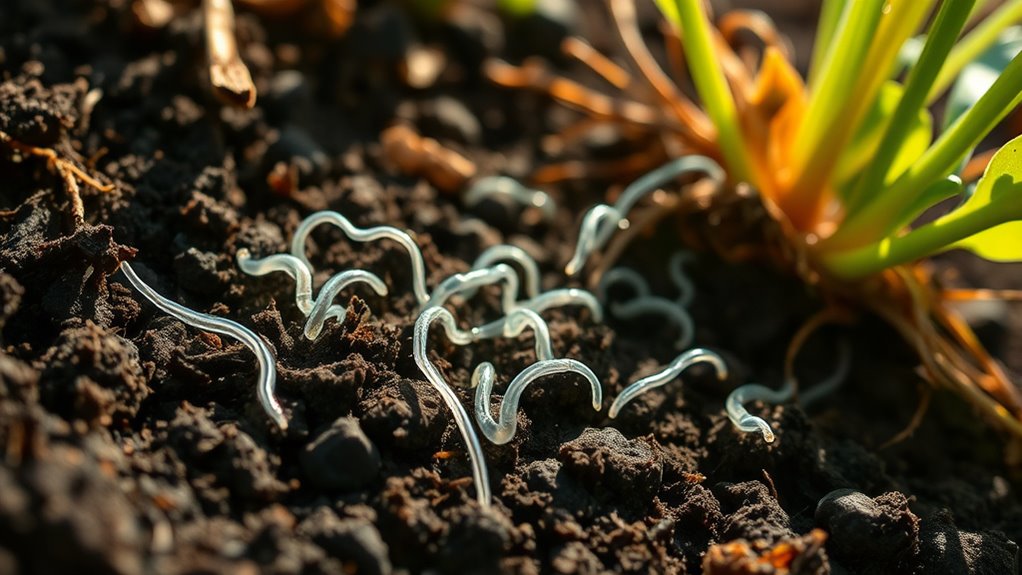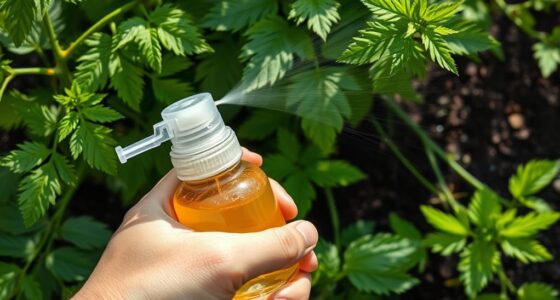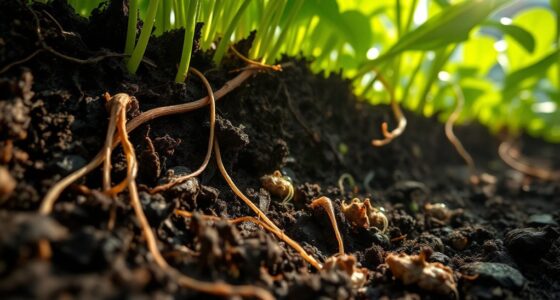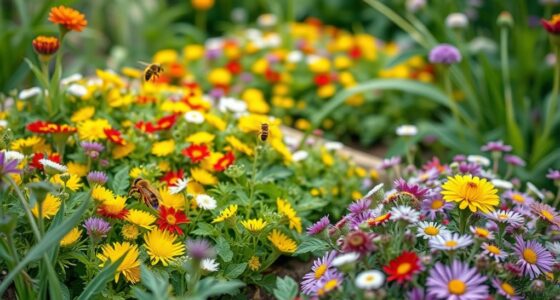Meet your garden’s bodyguards: beneficial nematodes are tiny, natural predators that hunt pests like grubs, beetles, and caterpillars underground before they can harm your plants. They’re easy to apply, safe for beneficial insects and wildlife, and work best in warm, moist soil during late spring or early summer. Using them reduces the need for chemicals and promotes healthier soil. Keep exploring to discover how these helpful allies can protect your garden naturally.
Key Takeaways
- Beneficial nematodes are natural, soil-dwelling predators that target and infect harmful pests like grubs and beetles.
- They offer an eco-friendly pest control method, reducing reliance on chemical pesticides and supporting soil health.
- Apply nematodes during warm, moist conditions, preferably early morning or late evening, for maximum effectiveness.
- Suitable for gardens, lawns, flower beds, and compost piles, and should be reapplied seasonally or after heavy rains.
- Using nematodes helps maintain a balanced ecosystem, promotes healthy plants, and enhances overall garden sustainability.

Have you ever considered natural ways to control garden pests? If not, it’s time to explore some effective pest control strategies that work in harmony with nature. Beneficial nematodes are tiny, soil-dwelling creatures that can become your garden’s secret weapon against a variety of pests. Unlike chemical pesticides, they offer a safe, eco-friendly alternative that promotes overall soil health improvement while targeting the pests directly. These microscopic worms actively hunt and infect pests like grubs, root maggots, beetles, and even some caterpillars, making them an invaluable tool for sustainable gardening.
Discover the natural pest-fighting power of beneficial nematodes for eco-friendly garden health.
When you introduce beneficial nematodes into your soil, you’re taking a proactive step in pest management that minimizes harm to beneficial insects, birds, and other wildlife. They work underground, seeking out pests in their larval or pupal stages, which are often the most destructive. Because they are natural predators, they won’t linger as chemical residues in your soil or plants, ensuring your garden remains healthy and safe for both you and the environment. This method of pest control supports soil health improvement since it encourages a balanced ecosystem where harmful pests are kept in check naturally, reducing the need for chemical interventions that can degrade soil quality over time.
Applying beneficial nematodes is straightforward, but timing is key. Usually, they should be introduced when pests are active or just before an infestation is likely to occur. For example, late spring or early summer often presents ideal conditions, especially when the soil is warm and moist. You’ll want to water your garden thoroughly before application to ensure the nematodes can travel easily through the soil. Then, you simply mix the nematodes with water as directed and spray or pour the solution over the affected areas. Since they are sensitive to sunlight, applying them during the cooler parts of the day, such as early morning or late evening, helps maximize their survival and effectiveness.
One of the best aspects of beneficial nematodes is their ease of use and versatility. They can be applied to vegetable gardens, flower beds, lawns, or compost piles. Reapplying every season or after heavy rains ensures continuous pest control and sustains soil health improvement. As a gardener committed to natural and sustainable practices, integrating beneficial nematodes into your pest control strategies not only keeps pests at bay but also enhances the vitality of your soil, leading to healthier plants and a more resilient garden environment.
Frequently Asked Questions
Are Beneficial Nematodes Safe for Pets and Children?
You’re wondering if beneficial nematodes are safe for pets and children. Rest assured, they are considered pet-safe and pose minimal risk when used as directed. Beneficial nematodes target specific soil pests, and their safety for children and pets makes them a great choice for protecting your garden without worrying about accidental exposure. Always follow application instructions to maximize pet safety and children protection, ensuring a healthy, pest-free garden environment.
How Long Do Beneficial Nematodes Remain Effective After Application?
You might wonder how long beneficial nematodes stay effective after application. Typically, their application longevity ranges from a few weeks to a couple of months, depending on environmental factors. Hot, dry conditions can shorten their effectiveness, while consistent watering and moderate temperatures help extend their activity. To maximize results, reapply as needed and monitor environmental conditions, ensuring the nematodes stay active and protect your garden longer.
Can Beneficial Nematodes Control Above-Ground Pests?
Beneficial nematodes mainly target soil-dwelling pests and have limitations when it comes to controlling above ground pests. They’re effective against underground larvae and grubs, but they can’t reach pests on plant surfaces or in the air. If you’re dealing with above ground pests, you’ll need to combine nematodes with other methods like insecticidal sprays or natural predators. Remember, nematode limitations mean they’re just one part of an integrated pest management plan.
Do Beneficial Nematodes Require Special Storage Conditions?
Imagine your beneficial nematodes as tiny warriors ready for battle, but they need the right armor—storage conditions—to stay effective. You should keep them in a cool, dark place, usually refrigerated, to maintain ideal storage requirements. Proper storage extends nematode longevity, ensuring they remain potent when released into your garden. Ignoring these needs can weaken their effectiveness, turning your garden’s defenders into mere shadows of their former power.
Are Beneficial Nematodes Effective in All Soil Types?
You might wonder if beneficial nematodes work in all soil types. Their effectiveness depends on soil compatibility and nematode diversity. They thrive best in moist, loose, and well-drained soils but can struggle in heavy clay or sandy soils. To maximize results, choose nematode strains suited to your specific soil conditions. Understanding soil compatibility helps guarantee you effectively use beneficial nematodes to target pests in your garden.
Conclusion
Think of beneficial nematodes as tiny knights patrolling your garden’s kingdom. They silently hunt down pests like invaders, keeping your plants safe and healthy. With these microscopic guardians on your side, you create a natural fortress where pests dare not enter. Embrace these fierce yet unseen protectors, and watch your garden flourish like a well-guarded treasure. Together, you and your nematodes build a peaceful, pest-free sanctuary, flourishing under nature’s quiet, mighty watch.









